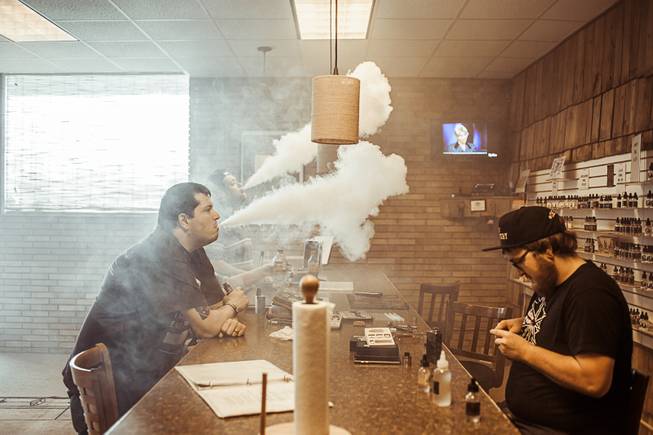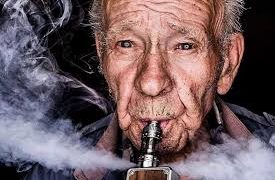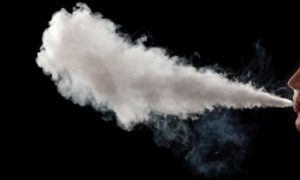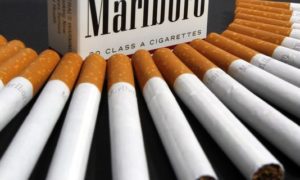
WASHINGTON — The e-cigarette and cigar industries have enlisted high-profile lobbyists and influential congressional allies in an attempt to stop the U.S. Food and Drug Administration from retroactively examining their products for public health risks or banning them from the market.
The campaign targets a broad new rule that extends FDA jurisdiction to include cigars, e-cigarettes and pipe and hookah tobacco.
The bipartisan effort has featured a former senator who did not register as a lobbyist before going to work for the cigar companies and a former Obama administration official, now a private consultant, who is trying to undo his earlier work reviewing the rule. In addition, one member of Congress introduced industry-written legislation without changing a word of it.
The battle shows how, nearly two decades after the $200 billion settlement between tobacco companies and state attorneys general to compensate the public for health consequences of smoking, the industry still wields extraordinary clout in Washington.
With its army of more than 75 lobbyists, tobacco-aligned companies have argued that the FDA’s so-called Deeming Rule could hurt public health by forcing a large share of e-cigarette companies out of business.
“The FDA has blatantly ignored evidence that our products improve people’s lives,” said Christian Berkey, chief executive of Johnson Creek Enterprises, one of the first companies to sell the e-liquid ingredient used in e-cigarettes and vaping products.
FDA officials acknowledge that e-cigarettes, made out of tobacco-derived nicotine, are potentially less harmful than cigarettes. But they insist they must examine whether the electronic cigarettes or the liquid nicotine juices might contain toxic chemicals like diethylene glycol, an ingredient also used in antifreeze, or candy-like flavors contributing to the surge in the numbers of teenagers using e-cigarettes. They also want to examine the safety of the e-cig devices themselves after reports of battery-related burns.
“In the absence of science-based regulation of all tobacco products, the marketplace has been the wild wild West,” said Mitch Zeller, the director of the FDA’s Center for Tobacco Products, which is in charge of enforcing the new rule. “Companies were free to introduce any product they wanted, make any claim they wanted, and that is how we wound up with a 900 percent increase in high schoolers using e-cigarettes and as well as all these reports of exploding e-cigarette batteries and products that have caused burns and fires and disfigurement.”
The lobbying effort has been led by the Altria Group, the nation’s largest tobacco company, which has a growing e-cigarette unit. Documents obtained by The New York Times show that Altria last year distributed draft legislation on Capitol Hill that would eliminate the new requirement that most e-cigarettes already on sale in the United States be evaluated retroactively to determine if they are “appropriate for the protection of public health.”
The proposal was endorsed by the R.J. Reynolds Tobacco Co., which has its own e-cigarette unit, as well as the National Tobacco Co., a major seller of loose tobacco, and trade associations representing the cigar industry and convenience stores, the documents show.
Altria delivered its proposal, “FDA Deeming Clarification Act of 2015,” to U.S. Rep. Tom Cole, R-Okla., in April 2015, the documents show, even before the FDA rule became final.
Just two weeks later, Cole introduced the bill — with the title and 245-word text pulled verbatim from the industry’s draft.
“Yes, we have shared our views with many policymakers, including Congressman Cole’s office,” David Sutton, a spokesman for Altria, said in a written statement, after being presented with a copy of its “legislative language” draft and Cole’s resulting bill, which has 71 co-sponsors and is still pending in the House.
Separately, former Sen. Mary Landrieu, D-La., spent part of her first year after losing re-election pressing officials from the White House, State Department and FDA on behalf of the cigar industry — even though records show she had not registered as a lobbyist as required by federal law, which Landrieu said was an oversight.
“This is my fault,” she said. “I’m calling my lawyer now to get it corrected.”
The electronic vapor industry — representing smaller companies that sell e-cigarettes that can be refilled with vapor juice — also have a lobbying contingent, buttressed by a highly motivated community of consumers and vape shops.
Cole and Rep. Sanford Bishop Jr., D-Ga., who co-sponsored one of the tobacco-related measures originally drafted by Altria, said that the rule would bankrupt small businesses and curb the availability of e-cigarette options, which some use as a way to quit smoking.
“I don’t like regulating in the rearview mirror,” Cole said in an interview.
Bishop and Cole are also two of the top House recipients of tobacco industry campaign donations, with Bishop receiving $13,000 from Altria this election cycle and a total of at least $60,000 from the industry since 2004.
Rep. Nita M. Lowey of New York, the ranking Democrat on the House Appropriations Committee, said it was embarrassing that more than 70 lawmakers had signed on as co-sponsors of legislation that lobbyists from Altria and other industry groups originally wrote.
“For Congress to consider going backward in how we regulate the public health hazard is simply mind-boggling,” she said. “It wasn’t that long ago that tobacco companies were telling the public that cigarettes were not addictive and denying clear evidence that they caused cancer.”
Matthew L. Myers, president of the Campaign for Tobacco Free Kids, who helped negotiate the 1998 tobacco settlement, said: “It is worse than spoiled kids who don’t get their way. It is bullies that don’t get their way and who are holding public health hostage.”
Industry executives and their allies on Capitol Hill dismiss such criticism, noting that they support provisions intended to prevent youths from buying and using e-cigarettes or cigars.
“The argument that it would make it more accessible to children is fallacious,” Bishop said.
The cigar industry lobbying pitch has gained the most traction in Congress.
Arguing that premium cigars are more of a recreational product with fewer health risks than cigarettes, the industry has been separately pushing members of Congress to enact legislation that would broadly exempt “premium cigars” from the new FDA oversight. A bill to do so — also written in part by industry lobbyists — was introduced by Sen. Bill Nelson, D-Fla. It has 20 co-sponsors, while an identical bill in the House has another 165 co-sponsors.
The industry lobbyists, in addition to Landrieu, include Paul DiNino, a former finance director of the Democratic National Committee and onetime senior aide to Sen. Harry Reid of Nevada, the Democratic leader. DiNino is assigned to enlist prominent Senate Democrats. Reid, records show, contacted the White House on the industry’s behalf, with his spokeswoman explaining that cigar-oriented events are important to Las Vegas.
To target the House, the cigar industry hired former Rep. James T. Walsh, R-N.Y., a former House Appropriations Committee member, who has implored lawmakers and their staffs to back the exemption for cigars.
Walsh and his lobbying partners from the firm K & L Gates drafted language that was inserted into a House Appropriations bill approved by the full committee in April that defines an exemption for a premium cigar and that would prohibit the FDA from spending money in the 2017 fiscal year on enforcement provisions.
“My fingers are crossed,” Walsh said, about the prospects for getting the exemption.
Another critical assist came from Andrew Perraut, who until 2014 served as a desk officer at the Office of Management and Budget division that reviews major federal regulations, including the FDA’s tobacco rule. White House records show that he helped represent the Obama administration at more than a dozen meetings with outside parties, mostly pressing the government to ease the rule, before he was hired by a cigar-industry trade organization and by NJoy, a manufacturer of e-cigarettes.
Within less than a year, records show, Perraut was back at the Office of Management and Budget on the other side of the table.
Because Perraut was not a senior official and the regulation affects numerous industry players, federal revolving door rules did not apply, an agency spokeswoman said. Perraut said he was simply trying to help stop a “train wreck” that will be caused by the FDA overreach.
Richard W. Painter, who served as the White House chief ethics lawyer during the George W. Bush administration, said Perraut’s quick turnabout violated the spirit of President Barack Obama’s ethics pledge, intended to prevent former aides from lobbying the executive branch.
“Even if it is not prohibited, it is just not appropriate,” he said.
Interest groups attempting to shape the debate also have financial patrons with a clear stake in the outcome.
Americans for Tax Reform, a conservative group, and National Center for Public Policy Research, a pro-free market think tank, have come out against the FDA rules, even as they receive funding from the e-cigarette and tobacco industry, including Altria and R.J. Reynolds, records show.
Jeff Stier, a scholar at the National Center for Public Policy Research, and Grover Norquist, from Americans for Tax Reform, both said they opposed the FDA rule as bad policy.
The American Lung Association, which has spoken out in defense of the rule, accepts contributions from pharmaceutical companies like Pfizer and GlaxoSmithKline, which sell smoking-cessation products that could lose sales if e-cigarettes continue to gain market share, Stier added.
Erika Sward, an association lobbyist, while acknowledging the money her nonprofit group has received from companies that sell smoking-cessation treatments, said the criticism of her group is a diversionary tactic.
“For so many years the focus in fighting tobacco wars has been on the cigarette industry,” she said. “With historic declines in cigarettes use, which is wonderful, what we are seeing is a surge in use of other tobacco products. And their push on Capitol Hill reflects this new clout.”
Click here to view original web page at lasvegassun.com






















